新概念二册 Lesson 2 Breakfast or lunch课时练习题(无答案)
新概念第二册第2课课件

Breakfast or lunch?
单词学习
• • • • • until outside ring(rang, rung) aunt repeat prep. 直到 adv. 外面 v. (铃、电话等)响 n. 姑,姨,婶,舅母 v. 重复
• ★until prep.直到 • until用于表示动作、状态等的持续,可译为“一 直到……为止”或“在……以前”。 • 在肯定句中,它与表示持续性状态的动词连用, 表示某动作持续到某一时刻: • 我会在这里等到5点钟。 • I’ll wait here until 5. • 直到他回来为止,他爸爸都是活着的. • His father was alive until he came back. • 在否定句中,它通常与描述短暂动作的动词连用, 表示“到……为止”、“直到……才”: • 她到6点才能来。 • She cannot arrive until 6. • 直到他回来,他爸爸才死. • His father didn't die until he came back.
• It was Sunday. • it指时间、天气、温度或距离,被称为“虚主 语”。 • 作为第三人称单数的中性代词,it可以指一件 东西、一件事件或用来指是什么人: • 从公司到我家大概有5公里。 • It is about 5 kilometer from the company to my home. • 这是个可爱的小婴儿。 • It is a lovely baby.
• Just then, the telephone rang. It was my aunt Lucy. • just then: 就在那时 • 如果不知道对方性别, 他/她可以用it取代 • 这是谁? • Who is it ?
新概念 第二册 Lesson 2 Breakfast or lunch (自带课文视频和听力)

Grammar 现在进行时
形式:__a_m__/_i_s_/_a_r_e__+__d__o_i_n_g___
表示说话时正在进行的动作。 e.g. He is watching TV now.
5. It was my aunt Lucy. ‘I’ve just arrived by train,’ she said. ‘I’m coming to see you.’
词组:by train表示交通方式,放在 __句__末___
翻译:我坐公交车去上班。 __I _g_o__t_o__w__o_r_k__b__y__tr_a_i_n_.__
New words and expressions
1. until [ʌnˈtɪl] prep. 直到 2. outside [ˌaʊtˈsaɪd] adv. 外面 3. ring [rɪŋ] v. (铃,电话等)响 4. aunt [ɑːnt] n. 姑,姨,婶,舅母 5. repeat [rɪˈpiːt] v. 重复
长啥样? be + doing?
时间状语: _n_o__w__/__a_t_p__r_e_s_e_n__t_/__a_t_t_h__e__m__o_m__e__n_t_/__l_o_o_k__/__l_is_t_e_n__
翻译:宝宝正在睡觉。 ___T_h__e__b_a_b__y__is__s_l_e_e_p__in__g_.__
2. outside adv. 外面
反义词: __in__s_id__e__ e.g. Please wait outside.
新概念二Lesson2(共20张PPT)精品课件
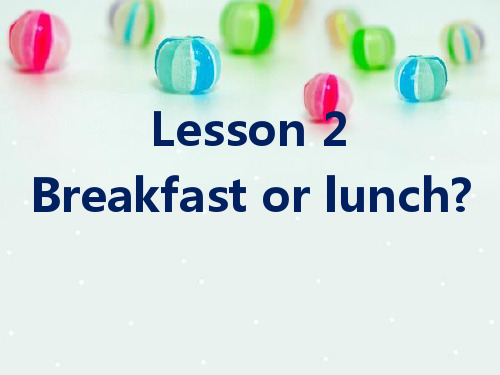
• It’s 8 o’clock.
• It’s cold.
• It’s 3 kilometers from my home to school.
Lesson 2 Breakfast or lunch?
• 周末的早上总是睡懒觉的好时候。但 是,当懒洋洋的你一觉醒来,发现到 了中午或者接近中午的时候,吃饭成 为一件令人头疼的事情。早饭,太晚; 午饭,太早。大洋彼岸的美国人也经 常为此烦恼,还为此演绎了一种独特 的饮食文化——早中饭(brunch)
频度副词一般放在主语之后, 实义动词之前 如果是be动词,放在be动词之后 He is often late for school.
Present continuous tense现在进行时
• 构成:主语+am/ is/ are + 现在分词 • 功能: • ⑴ 表现在正在进行的动作。 I’m still having breakfast. I am reading in bed now.
功能: • ⑴ 表现在的事实、状态或动作: • eg: Birds fly. She loves music. • ⑵ 表习惯性动作, • 常与usually, always ,often, frequently, ever ,
every day, sometimes, rarely, never 频度副词连用。
雨才停了。
• ring:
n 戒指, 电话 • Lord of rings 《指环王》 Vt ring sb=call sb = telephone sb 给。。打电话 • 大拇指thumb 食指index finger 中指middle
新概念第二册 Lesson 2-breakfast or lunch
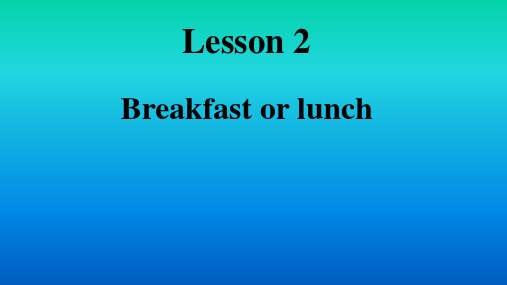
The early bird catches the worm.
Homework
1.熟记第2课的全部单词; 2.听录音30min, 熟读课文直至背诵;
Thank you See you next time.
感叹句
2.结构:
① How+adj./adv.+主+谓! eg. How clever the boy is! ② What+(a/an)+adj.+n.+主+谓! eg. What a clever boy he is! ③What+adj.+可n.复/不可n.+主+谓! eg. What cute puppies (these are)!
Language points
Last Sunday I got up very late. I looked out of the window. It was dark outside.
dark outside 外面黑
look out of the window
向外看
‘What a day!’ I thought.
同往常一样
as usual
日子不好过
have a difficult time
维持秩序
keep order
在这种场合
on these occasions.
Lead in
Breakfast + Lunch =
早午餐
New words & Expressions
until [ʌn'til] prep. 直到 outside ['aut'said] ad.外面 ring [riŋ] (rang[ræŋ] ,rung [rʌŋ] ) v.(铃、电话等)响 aunt [ɑ:nt] n.姑,姨,婶,舅妈 repeat [ri'pi:t] v. 重复
新概念第二册-第二课
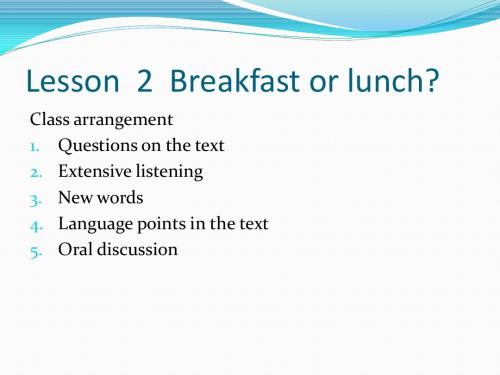
现在进行时 现在进行时表示说话的当时正在发生或正在发生的事件, 也用来表示现阶段(一段时间)的动向。 I am working as a teacher. "现阶段" 用法:目前或现在正在做某事 动词形式: be+现在分词(doing) 时间状语标志词:now, still, at this moment these days, right now 例句:what are you doing these days? we are talking in English now.
10. I've just arrived by train, by 直接加交通工具(不能有任何修饰词, 复数);如果加 修饰词, 就要换掉by用in或on I go out in/on two buses. (指具体的两辆车介词用 in/on)如果是特指的交通工具,则要加冠词或其他限 定词:My aunt left by the 9:15 train. by air 乘飞机 by bicycle/bike 骑自行车by boat 乘船 by bus 乘公共汽车by car 乘小汽车 by land 由陆路by plane 乘飞机 by sea 由海路by ship乘船by train 乘火车
Oral discussion Healthy lifestyle: 1.Get up early and go to bed early 2.Insist on exercising yourself everyday 3.Eat healthy food and develop healthy eating habit. 4. Learn to relax yourself and keep a happy mood.
新概念英语第二册Lesson2说课讲解
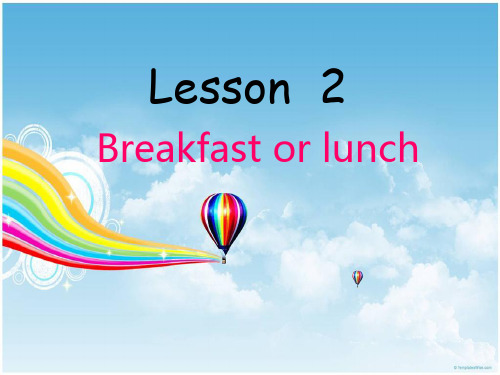
【New words 】
1 until prep. 直到 2 outside adv. 外面 3 ring v. (铃、电话等)响 4 aunt n. 姑,姨,婶,舅母 5 repeat v. 重复
★until prep. 直到
until 用 于表示动
Reading
Predict:
1.What do you think this passage will talk about after reading the title?
2.What is the main idea of the passage?
I always get up late on Sundays. And my aunt was surprised that I was still having breakfast in the afternoon last Sunday.
to wait just outside the door
3. ring (rang, rung)
动词 ①鸣,响(铃,电话等) eg. Every moring the clock ring at 6.
The telephone is ringing. ①打电话给
ring sb. eg. Tomorrow I'll ring you.
直到中午雨才停止。
I did not learn it until yesterday . 到昨天我才知道。
He did not show himself in his true colors until he gained power. 直到他掌权之后,他才露出自己的真 面目。
新概念2--lesson-2-Breakfast-or-lunch讲解

I stay in bed until twelve o'clock. (translate) I didn't get up until 12 o'clock.
2. outside (1) n. the outside of the house (2) adj. 外面的,外来的 an outside toilet 户外厕所 outside help外来的帮助 (3) adv. 在外面 It was dark outside. Please wait outside. (4) prep. It’s outside my business. 这不关我的事。 (5) 反义词: inside n./adj./adv./prep. (6) outsider: n 局外人
Filling: Five-nuts Red bean paste Lotus seed paste Salted duck egg yolk
Review
Go to the theatre Take a seat//be seated Interesting/interested/boring Behind//in front of Loudly/quietly Be angry with//angrily Rudely//politely Hear Turn round//turn around Pay attention to// pay no attention In the end None of your business//mind your own business Private conversation
got up very late. I looked out of the window. It was dark outside. “What a day!” I thought. “It’s raining again.” Just then, the telephone rang. It was my aunt Lucy. “I’ve just arrived by train,” she said. “I’m coming to see you.”
新概念英语第二册课件-(lesson-2-Breakfast-or-lunch)(29张)(共29张PPT)

7. Was his aunt very surprised or not ?
Exercises
I am looking out of my window. I can see some children in the street. The children ______ (play) football. They always ______ (play) football in the street. Now a little boy ______ (kick) the ball. Another boy ______ (run) after him but he cannot catch him.
介词on一般用于表示某一天的时间短语中 on that day 在那天
on on Monday morning在星期一上午 on September 11,2010
所有的星期天,每逢星期天
Sundays
I often go shopping on Sundays. He sometimes swims on Sundays.
★ It was Sunday.那是个星期天
It
被
It is hot today.今天挺热的。
称
为
It is 12 o’clock now.现在12点。
虚
主
It is me.是我。
语
it指时间、天气、温度或距离,也可以指 一件东西、一件事件或用来指是什么人 。
★ I never get up early on Sundays
新概念英语第二册第二课完美教案Lesson2BreakfastorLunch
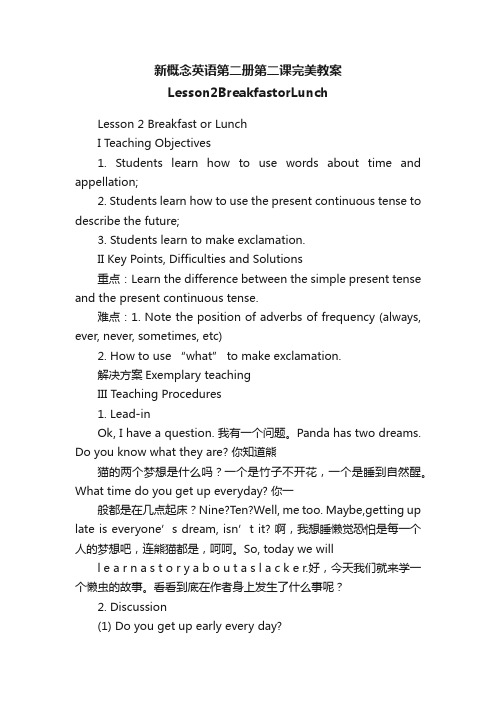
新概念英语第二册第二课完美教案Lesson2BreakfastorLunchLesson 2 Breakfast or LunchI Teaching Objectives1. Students learn how to use words about time and appellation;2. Students learn how to use the present continuous tense to describe the future;3. Students learn to make exclamation.II Key Points, Difficulties and Solutions重点:Learn the difference between the simple present tense and the present continuous tense.难点:1. Note the position of adverbs of frequency (always, ever, never, sometimes, etc)2. How to use “what” to make exclamation.解决方案Exemplary teachingIII Teaching Procedures1. Lead-inOk, I have a question. 我有一个问题。
Panda has two dreams. Do you know what they are? 你知道熊猫的两个梦想是什么吗?一个是竹子不开花,一个是睡到自然醒。
What time do you get up everyday? 你一般都是在几点起床?Nine?Ten?Well, me too. Maybe,getting up late is everyone’s dream, isn’t it? 啊,我想睡懒觉恐怕是每一个人的梦想吧,连熊猫都是,呵呵。
新概念英语第二册第2课 完整

from time to time 有时候 • almost never;hardly ever;rarely;
scarcely ever;seldom 很少 • not…ever;never 从不
not until...
She didn't go to bed until eleven o'clock. 她直到十一点才上床睡觉。
They didn't find her until the next day. 他们直到第二天才找到她。
• outside /'aut'saɪd/ n. 外面,外部,外观 备注:inside 里边 outsider 局外人
• aunt /a:nt/ n. 姑母,姨母,阿姨,伯母,舅母,舅妈 uncle 叔叔,伯伯,伯父
• repeat /ri'pi:t/ n. 重复 v.重复
He repeated several times that he was busy. Today's lecture was an exact repeat of yesterday's.
Listen to the story and keep these questions in mind.
• What was the weather like last Sunday? • Who was coming to see the writer? • Why was the writer's aunt surprised?
新概念英语第二册 第2课Breakfast or lunch
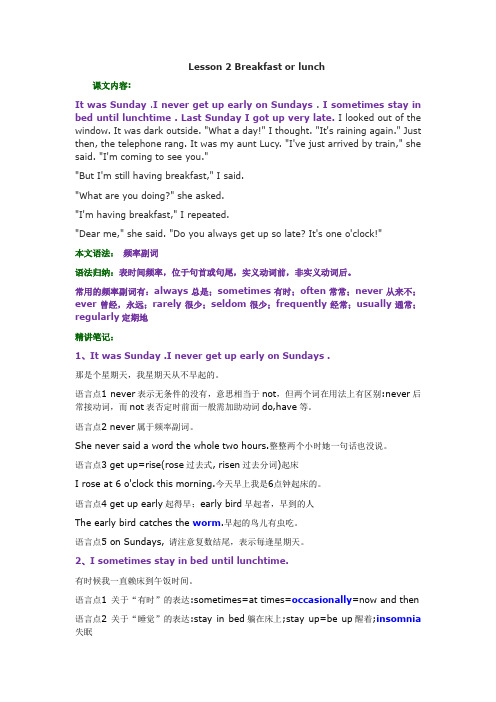
Lesson 2 Breakfast or lunch课文内容:It was Sunday.I never get up early on Sundays. I sometimes stay in bed until lunchtime. Last Sunday I got up very late.I looked out of the window. It was dark outside. "What a day!" I thought. "It's raining again." Just then, the telephone rang. It was my aunt Lucy. "I've just arrived by train," she said. "I'm coming to see you.""But I'm still having breakfast," I said."What are you doing?" she asked."I'm having breakfast," I repeated."Dear me," she said. "Do you always get up so late? It's one o'clock!"本文语法:频率副词语法归纳:表时间频率,位于句首或句尾,实义动词前,非实义动词后。
常用的频率副词有:always总是;sometimes有时;often常常;never从来不;ever曾经,永远;rarely很少;seldom很少;frequently经常;usually通常;regularly定期地精讲笔记:1、It was Sunday .I never get up early on Sundays .那是个星期天,我星期天从不早起的。
(完整word版)新概念第二册Lesson2Breakfastorlunch详解
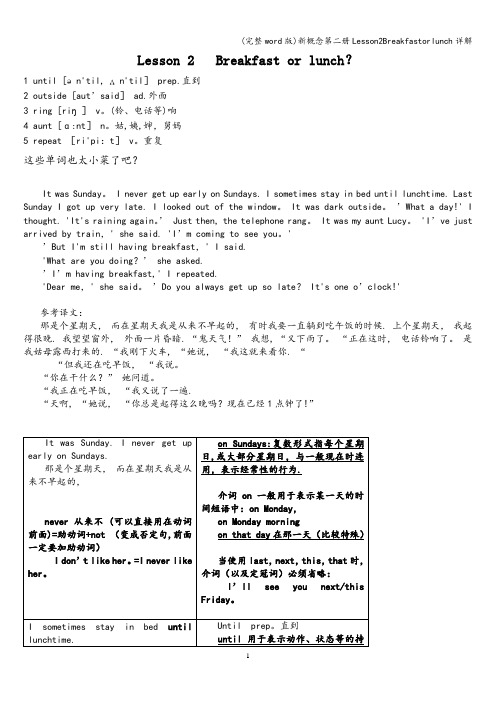
Lesson 2 Breakfast or lunch?1 until [ən'til, ʌn'til] prep.直到2 outside [aut’said] ad.外面3 ring [riŋ] v。
(铃、电话等)响4 aunt [ɑ:nt] n。
姑,姨,婶,舅妈5 repeat [ri'pi:t] v。
重复这些单词也太小菜了吧?It was Sunday。
I never get up early on Sundays. I sometimes stay in bed until lunchtime. Last Sunday I got up very late. I looked out of the window。
It was dark outside。
’What a day!' I thought. 'It's raining again。
’ Just then, the telephone rang。
It was my aunt Lucy。
'I’ve just arrived by train,' she said. 'I’m coming to see you。
'’But I'm still having breakfast,' I said.'What are you doing?’ she asked.’I’m having breakfast,' I repeated.'Dear me,' she said。
’Do you always get up so late? It's one o’clock!'参考译文:那是个星期天,而在星期天我是从来不早起的,有时我要一直躺到吃午饭的时候. 上个星期天,我起得很晚. 我望望窗外,外面一片昏暗. “鬼天气!” 我想, “又下雨了。
新概念英语2 Lesson 2 Breakfast or lunch课件讲解

The room ________ with laughter(笑声) of happy children.
A. listened B. rang C. heard D. repeated
I am afraid the same tragedy(悲剧) of yours will ______ itself.
‘But I'm still havijnugsbtretahkefans:t,就’ I s在aid那. 时 如果不知道对方性别, 他/她
Lesson 2 Breakfast or lunch?
词汇
until
I sometimes stay in bed until lunchtime prep. 直到 until前的状态一直持续到until 后的时间!
Tom玩电脑游戏一直玩到他妈妈回来。 Tome played computer games until his mother comeback. 直到听到闹钟(alarm clock)的铃声我才醒过来(wake up )。 I didn’t wake up until I heard the alarm clock. 直到他妈妈回来,他才开始做作业。 He didn’t do homework until his mother came back
在表达卧床时bed前不需加冠词: ‘But I'mIts’stiltl ihmaveinfgobrrebaekfdasnt,o’ Iwsa. id. ‘What aYroe uyomu duosintgs?’tsahye/arsekmed.ain in bed for
精讲新概念英语第二册(第2课)(课堂PPT)

19
v.给某人打电话:ring sb n.打电话:give sb a ring
Remember to ring me. = Remember to give me a ring.
20
词汇联想记忆法
21
n. 环, 圈
small circular band of precious metal, often set with a gem or gems, worn esp on the finger 用 贵金属制造的(常镶有珠宝的)小环, 小圈; (尤指)戒指:
wait until tomorrow
等到明天
我想在这儿呆到圣诞节.
I'd like to stay here up until Christmas.
6
up to the time of (a specified event) 直到(发生某事)
Don't open it till your birthday.
A. when B. until C. as D. after
14
考点:not until 放在句首时 一般要用到装语序
Not until the game had begun _______ at the sports ground. (2006年大学英语四级考试)
A. had he arrived B. would he have arrived C. did he arrive D. should he have arrived
By the end of last year we had built two new houses.
新概念英语第二册 第二课 Lesson02 breakfast or lunch课件

• aunt
n. 姑,姨,婶,舅母
• repeat v. 重复
Key points
➢ until prep.直到 until用于表示动作、状态等的持续,可译为“一直 到……为止”或“在……以前”。在肯定句中,它 与表示持续性状态的动词连用,表示持续到某一时 刻:
e.g. I’ll wait here until 5. His father was alive until he came back.
niece nephew cousin offspring ancestor mother-in-law father-in-law husband wife grandson foster mother
Key points
➢ repeat ① vt. 重复
e.g. Will you repeat the last word?
It is cold outside. ➢ ring(rang. rung) e.g. Every morning the clock rings at 6. 而风铃等响要用jingle,jingle (bell) (铃儿) 响叮当 ② vt. 打电话给(美语中用call)ring sb. Tomorrow I'll ring you. ③ n. (打)电话 give sb. a ring Remember to give me a ring. ④ n. 戒指
They are repeating that wonderful paly. ② vi. 重做,重说
e.g. Please repeat after me.
Don’t repeat. ➢ repeat return reappear rearrange rebirth rebound
新概念英语第二册 Lesson 2 Breakfast or lunch课件
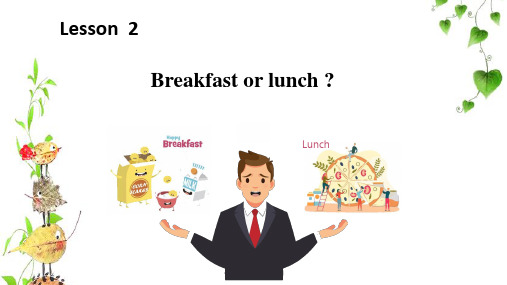
4 repeat
aunt
until 用没英有文吝夸啬夸你
你的的表同扬学+5
hard
2 班 喜跟u她欢上起n/+t谁最他3il一? repeat ring outside
1ring aunt 想 歌唱ou不?歌ts想-i2d分唱e! repeat
Listening Look, listen and answer
Lesson 2 Breakfast or lunch ?
Lunch
Free Talk
Hey,guys!What makes you get up?
Free Talk
alarm
dream
keep fit
breakfast
homework
Free Talk
Which way do you get up?
Q1: Does the writer always get up early on Sundays or does he always get up late? Q2: Who telephoned then? Q3: What was the time?
Listening
Listening
Look, listen and answer
Fill in the blanks 1
It was Sunday. I never get up early on Sundays. I
sometimes stay Sunday I got up
ivnerybeladt_e_.u_nI_ti_l loolkue Talk
When do you get up on Sundays?
New Words
- 1、下载文档前请自行甄别文档内容的完整性,平台不提供额外的编辑、内容补充、找答案等附加服务。
- 2、"仅部分预览"的文档,不可在线预览部分如存在完整性等问题,可反馈申请退款(可完整预览的文档不适用该条件!)。
- 3、如文档侵犯您的权益,请联系客服反馈,我们会尽快为您处理(人工客服工作时间:9:00-18:30)。
xgn 2 Lesson 2 Breakfast or lunch?
1.____breakfast is ___ first meal of the day. I often have ___healthy breakfast every day.
A.The ,the ,a
B. /,the ,a
C. /, the, the
D. The,the,/
2.It was ____ Saturday yesterday. A.on B.at C. in D. /
3.It is not difficult ____us _____ English well.
A.for, to learn
B.of , learning C for, learning
4.Tom never____ up early on weekends. A. get B gets C getting D.to get
5.We will see each other again______.
A.sometime
B.sometimes
C.some time
D.some times
6.How do you go to school? ____ foot. A. By B. In C. On D. For
7.My sister always ____up late on Sundays last year.
A. get B gets C getting D.got
8.____ ! The bus is coming.
A. Look out
B. Look out of
C. Look for
D. Look for
9.Don’t ____the window in class.
A. look out
B. look out of
C. look for
D. look for
10.I have already been to Beijing ____.
A.sometime
B.sometimes
C.some time
D.some times
11.I need ____ to do my homework every day.
A.sometime
B.sometimes
C.some time
D.some times
12.They arrived _____ the village last night. A.in B. at C. to D /
1/ 4
13.The shop won’t open ____ ten o’clock. A. until B on C in
14.-How did aunt Lucy arrive ? -_____. A. By a train B .By car C . By buses
15.______ surprising news it is! A. What a B. What C. How D . How a
16.______fine weather ! A. What a B. What C. How D . How a
17._____honest boy Jim is! A. What a B. What C. How D . How a
18._____interesting books! A. What a B. What C. How D . How a
19._____exciting news report we watched yesterday evening.
A. What a
B. What
C. How D . How a
20.____ strongly the wind blows! A. What a B. What C. How D . How a 二根据首字母或所给词的适当形式填空:
1.The clock didn’t r_____ this morning.
2.The woman is the wife of your father’s brother,so she is your a_____,and her son is your______, and her husband is your ________.
3.It’s cold o_______. Put on your coat.
4.She ________(write ) a letter now.
5.The singer ________(sing) three songs on TV once a month.
6.My mother ________(arrive ) here to see me next month.
7.The man _________(wait) for the bus here a moment ago.
8.Look! Something _________(lie) there.
9.Please hold on. The doctor ________________(come).
10.Everyone __________(want) a good job.
三句型转换
1.It is bad news. (感叹句) ___________________________!
2/ 4
2.He did the work very carefully. (感叹句)_______________________!
3.You have a warm heart. (感叹句)_______________________!
4.We are having a good time. (感叹句)__________________________!
5.Time passed quickly. (感叹句)______________________________!
6.I’m never late for school. (改为肯定句)_________________________!
7.She always visits her grandparents on Sundays.
= She always visits her grandparents______ _______.
8. He’s having dinner.(就划线部分提问) ____________________________?
9. It was rainy yesterday. (同上)_______________________________?
10. I’ve just arrived by train.(同上)______________________________?
Ⅱ.完形填空
Mr Bush comes from 1 .He is now 2 a middle school in our city. He has sixty students. He often says his class is too big and it is hard work for him to talk with every student 3 English. He likes 4 black tea and green tea. He likes Chinese food 5 ,too. He doesn’t 6 drinking milk. He likes playing basketball, but he 7 play well. His son and I 8 in the same class. 9 name is James. We are 10 .
( )31.A. China B. Chinese C. a China D. a Chinese
( )32.A. for B. on C. in D. to
( )33.A. with B. in C. at D. for
( )34.A. to drinking B. drinks C. drink D. drinking
( )35.A. very much B. very C. many D. much
( )36.A. like B. likes C. liking D. to like
( )37.A. isn’t B. aren’t C. don’t D. doesn’t
( )38.A.be B. am C. is D. are
3/ 4
( )39.A,My B. Your C. His D. Her
( )40.A. a friend B. a friends C. friendly D. classmates
4/ 4。
